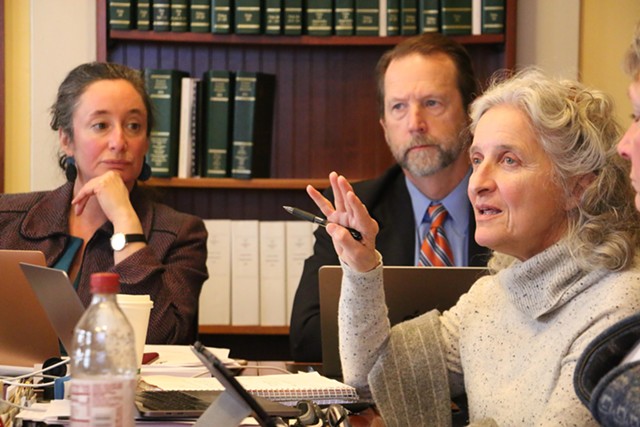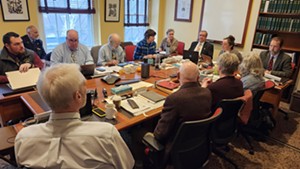
- Kevin McCallum ©️ Seven Days
- From Left: Reps. Emilie Kornheiser, Carl Demrow and Carole Ode during Tuesday's discussion
Vermont legislators on Tuesday discussed potential ways to head off hefty property tax hikes driven by education spending — including changing a law that they passed in 2022.
No immediate fix was made. But lawmakers discussed steps that would likely mean school districts would have to modify their budgets less than a month before Town Meeting Day. In some cases, towns might have to push school budget votes to a later date.
The House Ways and Means Committee and the Education Committee met jointly to address a projected $250 million statewide increase in education spending this year that could translate to an average property tax increase of more than 20 percent. That increase is being driven by a confluence of factors, including the rising cost of educators’ health insurance and wages; the loss of federal pandemic-era funds; and inflation.
Lawmakers also pointed to a problematic provision in Act 127, which was intended to give historically disadvantaged school districts additional “pupil weight” for instructing students who are more expensive to teach: those who are low-income, rural or in need of English language instruction. The provision would give those districts the ability to offer more services without raising taxes.
The Act 127 provision caps homestead property tax rate increases at 5 percent for the next five years, as long as school districts do not increase per-pupil spending by more than 10 percent year over year. Local school budget writers realized they could use the provision to add millions to their school budgets for much-needed capital improvements — without directly affecting property tax rates.
But that money isn’t “free.” In recent weeks, as more final school budget proposals emerged, it became clear that the cumulative spending increase statewide would lead to widespread tax increases. Once the numbers came into focus, administrators began sounding the alarm to legislators.
Lawmakers resolved to make changes. “We want to acknowledge the mistake that we made in this particular piece of Act 127,” Rep. Emilie Kornheiser (D-Brattleboro), who is chair of Ways and Means, said during a House Democratic caucus on Tuesday. “Act 127 was designed to increase tax equity, and this mechanism keeps us from having the kind of tax equity we were looking for.”
Legislators say it is necessary to scrap the tax-cap provision in Act 127 and instead use a transition mechanism called a “cents discount.” It would give districts that lose money over the tweaked pupil weights formula a discounted tax rate. This provision is expected to cost approximately $30 million from the education fund in fiscal year 2025, according to the Joint Fiscal Office, and could be scaled down over a five-year period.
Kornheiser said legislation is being drafted to allow districts to delay budget votes in order to redraft their spending proposals and notify the public. Under state statute, towns have to warn voters of their budgets before a vote. The legislature is also working with the Secretary of State’s Office to ensure that, should towns delay voting, the state’s general fund would cover the costs of a new election, Kornheiser said.
At the caucus, Kornheiser and Peter Conlon (D-Cornwall), the Education Committee chair, made clear that altering Act 127 would be just the first step in tackling Vermont’s complex and cumbersome education funding system this legislative session. The legislature will have to figure out other ways to mitigate the tax impact for voters, including exploring new revenue sources for the education fund, Kornheiser said. More “transformational change” to education funding may be needed, she added.
Senate President Pro Tempore Phil Baruth (D/P-Chittenden-Central) said the fact that the House is digging into possible solutions first doesn’t mean the Senate is doing nothing. “We are having discussions all over the building, every day, nonstop about this problem,” he said.
Kevin McCallum contributed reporting.
No immediate fix was made. But lawmakers discussed steps that would likely mean school districts would have to modify their budgets less than a month before Town Meeting Day. In some cases, towns might have to push school budget votes to a later date.
The House Ways and Means Committee and the Education Committee met jointly to address a projected $250 million statewide increase in education spending this year that could translate to an average property tax increase of more than 20 percent. That increase is being driven by a confluence of factors, including the rising cost of educators’ health insurance and wages; the loss of federal pandemic-era funds; and inflation.
Lawmakers also pointed to a problematic provision in Act 127, which was intended to give historically disadvantaged school districts additional “pupil weight” for instructing students who are more expensive to teach: those who are low-income, rural or in need of English language instruction. The provision would give those districts the ability to offer more services without raising taxes.
The Act 127 provision caps homestead property tax rate increases at 5 percent for the next five years, as long as school districts do not increase per-pupil spending by more than 10 percent year over year. Local school budget writers realized they could use the provision to add millions to their school budgets for much-needed capital improvements — without directly affecting property tax rates.
But that money isn’t “free.” In recent weeks, as more final school budget proposals emerged, it became clear that the cumulative spending increase statewide would lead to widespread tax increases. Once the numbers came into focus, administrators began sounding the alarm to legislators.
Lawmakers resolved to make changes. “We want to acknowledge the mistake that we made in this particular piece of Act 127,” Rep. Emilie Kornheiser (D-Brattleboro), who is chair of Ways and Means, said during a House Democratic caucus on Tuesday. “Act 127 was designed to increase tax equity, and this mechanism keeps us from having the kind of tax equity we were looking for.”
Legislators say it is necessary to scrap the tax-cap provision in Act 127 and instead use a transition mechanism called a “cents discount.” It would give districts that lose money over the tweaked pupil weights formula a discounted tax rate. This provision is expected to cost approximately $30 million from the education fund in fiscal year 2025, according to the Joint Fiscal Office, and could be scaled down over a five-year period.
Kornheiser said legislation is being drafted to allow districts to delay budget votes in order to redraft their spending proposals and notify the public. Under state statute, towns have to warn voters of their budgets before a vote. The legislature is also working with the Secretary of State’s Office to ensure that, should towns delay voting, the state’s general fund would cover the costs of a new election, Kornheiser said.
At the caucus, Kornheiser and Peter Conlon (D-Cornwall), the Education Committee chair, made clear that altering Act 127 would be just the first step in tackling Vermont’s complex and cumbersome education funding system this legislative session. The legislature will have to figure out other ways to mitigate the tax impact for voters, including exploring new revenue sources for the education fund, Kornheiser said. More “transformational change” to education funding may be needed, she added.
Senate President Pro Tempore Phil Baruth (D/P-Chittenden-Central) said the fact that the House is digging into possible solutions first doesn’t mean the Senate is doing nothing. “We are having discussions all over the building, every day, nonstop about this problem,” he said.
Kevin McCallum contributed reporting.














Comments
Comments are closed.
From 2014-2020, Seven Days allowed readers to comment on all stories posted on our website. While we've appreciated the suggestions and insights, right now Seven Days is prioritizing our core mission — producing high-quality, responsible local journalism — over moderating online debates between readers.
To criticize, correct or praise our reporting, please send us a letter to the editor or send us a tip. We’ll check it out and report the results.
Online comments may return when we have better tech tools for managing them. Thanks for reading.